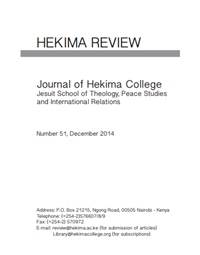The Malthusian Theory of Population Control and the Politics of Aid and Development in Africa: Towards an Integrative Approach
Keywords:
Malthusian Theory, DevelopmentAbstract
Population growth and food production constitute two interdependent factors that influence the economic development of any nation. However, the proper balance between population growth and food production and how to achieve it remains a contentious issue between scholars, policy makers and the Church mainly because some have advocated the use of artificial contraceptives to control population growth especially among the poor while others see in it a disguised way of exercising political and economic imperialism and a violation of human dignity. The Malthusian theory of population control which is our main focus in this essay provides an extensive exposition of this relationship between population growth and food production and how they have influenced the economic
development of Africa and shaped the international politics on the continent. Given that population control policies applied in poor countries seem to be self-interested on the part of developed nations and detrimental to the survival and the economic prosperity of people in less developed countries, this essay proposes an integrative approach which involves both socio-political and theological perspectives on population control policies in order to promote a more humane and more integral development of people in the sub-Saharan Africa.
Downloads
Downloads
Published
Issue
Section
License
Copyright (c) 2024 Hekima Review

This work is licensed under a Creative Commons Attribution-ShareAlike 4.0 International License.


